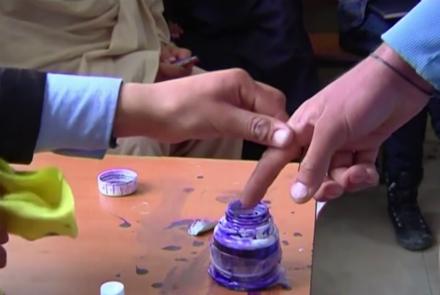As Afghanistan has only 34 days to hold the upcoming parliamentary elections, a number of major political parties have closed the offices of the Independent Election Commission (IEC) in Balkh, Kandahar and Herat provinces over their demands on a transparent election and a change in polls system.
The political parties that operate under the “Grand National Coalition” have warned to close the IEC offices in Nangarhar, Kunduz, Bamiyan, Panjsher, Faryab and Jawzjan provinces if their demands were not met.
Supporters of the coalition established sit-in camps near IEC office in Balkh on Saturday morning, insisting on the demands of the political parties including the use of a biometric system for elections, a change in election system and a transparent polls across the country.
The political parties have set deadlines for government few times to address its demands. Last time on August 10, the political parties set a 10-day deadline for a response from government to meet their demands on a change in the country’s election system and ensure that biometric system is used on the day of voting.
The parties include the Council for the Protection and Stability in Afghanistan, Jamiat-e-Islami party of Afghanistan, the National Islamic Movement of Afghanistan, Hizb-e Wahdat Islami Mardum-e Afghanistan and some political movements including Mehwar-e-Mardum-e-Afghanistan.
The political parties also levelled serious accusations on government leaders over what they described it deliberate attempts to deprive the people from the right to be informed about all aspects of free and credible elections.
The Ministry of Interior reacts to closure of IEC offices. Akhtar Mohammad Ibrahimi Senior Deputy Interior Minister for Security says closure of IEC offices is illegal. He says all government forces are responsible to ensure election offices safety and use force if needed.
The Independent Election Commission reacted to closure of its offices in the provinces and said the act is in contravention of the country's laws and that a national process should not face hurdle by the people and parties.
The commission called on Afghan government to fulfill its responsibility in ensuring the safety of IEC offices in the country.
President Ghani’s Decree On Elections
Last month, President Ashraf Ghani issued a decree on elections to prevent any interference in the election process and to ensure the process is held in a safe and transparent environment.
The decree was issued amid growing complaints over government’s “lack of commitment” in terms of holding transparent parliamentary elections in October.
The decree reads:
• Officials and employees of government departments including military, defense and civilian institutions, judiciaries and the Supreme Court officials must avoid interference in parliamentary and district council elections.
• Defense and security forces must not enter voter registration, polling and vote counting centers arbitrarily. They can get permission of responsible officials in case of need.
• Taking guns into voter registration, polling and vote counting centers is forbidden.
• Security and defense forces must ensure the security of officials and the central and provincial offices of the independent election commission and the independent electoral complaints commission, voter registration centers, polling stations and vote counting centers.
• Security forces must prevent the entrance of security guards of government officials and irresponsible armed individuals to voter registration centers, polling stations and vote counting centers.
• Government officials cannot use government resources in the electoral process in favor or against one or more candidates.
• Ministry of Interior Affairs is responsible to deploy enough female police force members in order to ensure more presence of women in elections.
• The Independent Election Commission and Independent Electoral Complaints Commission should inform relevant offices in case of any interference by officials in elections.
• Security and defense institutions must legally act against violators of this decree and send them to judicial organizations.
• Head of the relevant committee shall report to the Presidential Palace on the implementation of this decree.
Govt Considers SMTV System For Elections
The Afghan government is considering the Single Non-Transferable Vote (SNTV) system for the elections, however political parties and movements have asked for the use of the multi-dimensional representation (MDR) for the elections.
The SNTV is an electoral system used in multi-member constituency elections. In any election, each voter casts one vote for one candidate in a multi-candidate race for multiple offices. Posts are filled by the candidates with the most votes. Thus, in a three-seat constituency, the three candidates receiving the largest number of votes would win office.
The cost of the SNTV system is less but analysts said it has more defects.
It is believed that the system will mostly benefit independent candidates.
“In total, it (the SNTV system) increases complications, votes are wasted and finally in this system, parliament will not be party-based. It means that parliament groups cannot be better formed under this system,” Mohammad Naeem Ayubzada, head of the Transparent Election Foundation of Afghanistan, told TOLOnews on August 18.
With the MDR system, a vote can be transferred from one candidate to another which makes it different from the SNTV system. In this system, political parties and independent candidates will compete. In this system, political parties can have one candidate or they can introduce a candidate in coalition with other parties.
Independent candidates meanwhile can compete alone or they can take part in the election in collaboration with other independent candidates.
With the MDR system, if a party has at least 10 candidates, their candidates votes- that exceed the required number- can be transferred to other candidates from the same party. The same can be applied to independent candidates if they make an agreement.
Electoral watchdog organizations said the MDR system has its complications and is not applicable considering the little time remaining to October parliamentary elections.
Use Of ‘Modern Technology’ For Elections
President Ashraf Ghani last month directed the Central Statistic Organization (CSO) to use “modern technology” to specify the exact number of voters who will cast their votes at polling stations on election day.
According to Ghani’s decree issued in August, the CSO should cooperate with the Independent Election Commission (IEC), security agencies and other relevant institutions in determining the exact number of registered voters.
In the decree, the Ministry of Finance and the National Procurement Authority have been ordered to cooperate with the CSO and other departments in the allocation of budget and procurement for the technology.
Afghanistan's Central Civil Registration Authority (ACCRA) has said that they are ready to help the CSO determine the voter numbers.
The decree does not state details about whether a biometric system will be used to identify voters on election day.
According to the Independent Election Commission, over nine million voters have registered their names for the upcoming elections.


